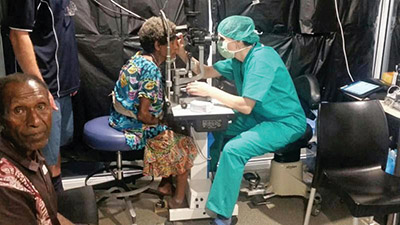
(Courtesy of Sheba Medical Center) Sheba Medical Center, Tel Hashomer, Israel’s national hospital, just completed its second successful humanitarian medical mission to Papua New Guinea where their team of medical experts performed over 80 life-transforming eye surgeries that restored vision to the blind. Led by the Israel Center for Disaster Medicine and Humanitarian Response at Sheba Medical Center, more missions are scheduled to take place in April and May of this year.
At the request of the Israeli Ministry of Foreign Affairs and in collaboration with Natan, an Israeli NGO, the Israel Center for Disaster Medicine and Humanitarian Response at Sheba Medical Center mobilized a team of ophthalmology specialists headed by Dr. Eva Platner, vitreo-retina specialist at the Goldschleger Eye Institute, to perform eye surgeries, primarily cataract surgeries. Sheba Medical Center’s Goldschleger Eye Institute is Israel’s largest academic ophthalmic center, known for excellence in eye care, research and teaching.
“Humanitarianism is a core value for Sheba Medical Center, and this successful medical mission to Papua New Guinea is the latest example of how we export our expert resources to help as many people as possible all around the world,” said Professor Yitshak Kreiss, Sheba Medical Center’s director general and former Israel Defense Forces surgeon general.
Sheba’s medical experts performed the surgeries in an operating theater while sailing aboard an Australian Youth with a Mission (YWAM) ship that traveled the coast in an effort to reach as many villages as possible. The team screened patients for cataract surgeries, most of which were for people blind in both eyes due to simple cataracts that had been neglected for years. The YWAM voyage, which took place from January 26 through February 11 included 120 people representing 20 nations. Two surgeons and three nurses from Sheba Medical Center were part of a 10-member Israeli team aboard the ship.
Dr. Platner provided Sheba Medical Center with frequent updates from the remote mission, such as this one from Papua New Guinea: “It’s been a hard but satisfying day onboard the YWAM medical ship. The day started with the post-cataract surgery patients from yesterday. They came early in the morning, and I can’t wait to take off their eye patches and have them see once again for the first time in years. This was followed by about a dozen more cataract surgeries for blind people under difficult weather and sea conditions. Knowing that our time here is short and we have to make the most of it made us overcome the harsh conditions, and continue operating.
“We’re trying to make a difference, and I hope it’s not just a drop in the big sea,” she reported. “It’s been a hard and sometimes complicated mission, both physically and mentally, but we overcame the challenges and… we helped a lot of people and their families see a brighter world once again.”
The Israel Center for Disaster Medicine and Humanitarian Response at Sheba Medical Center boasts highly experienced specialists who continue to lead the charge in preparing and responding to global humanitarian crises and emergencies.
Professor Kreiss has made responding to humanitarian crises effectively with the highest standards of medical care and crisis leadership a core priority. Teams from Sheba have successfully participated in life-saving humanitarian missions in Zambia, Tanzania, Nigeria, Nepal, Haiti and elsewhere.
Humanitarian aid has been a part of Sheba Medical Center’s mission since its establishment in 1948. Over the years, Sheba Medical Center has initiated successful projects in all fields of medicine, and has collaborated with national and international organizations in underserved regions. These projects include improvement in patient care, bringing complex patients for treatment back to Sheba and training local personnel on-site.










